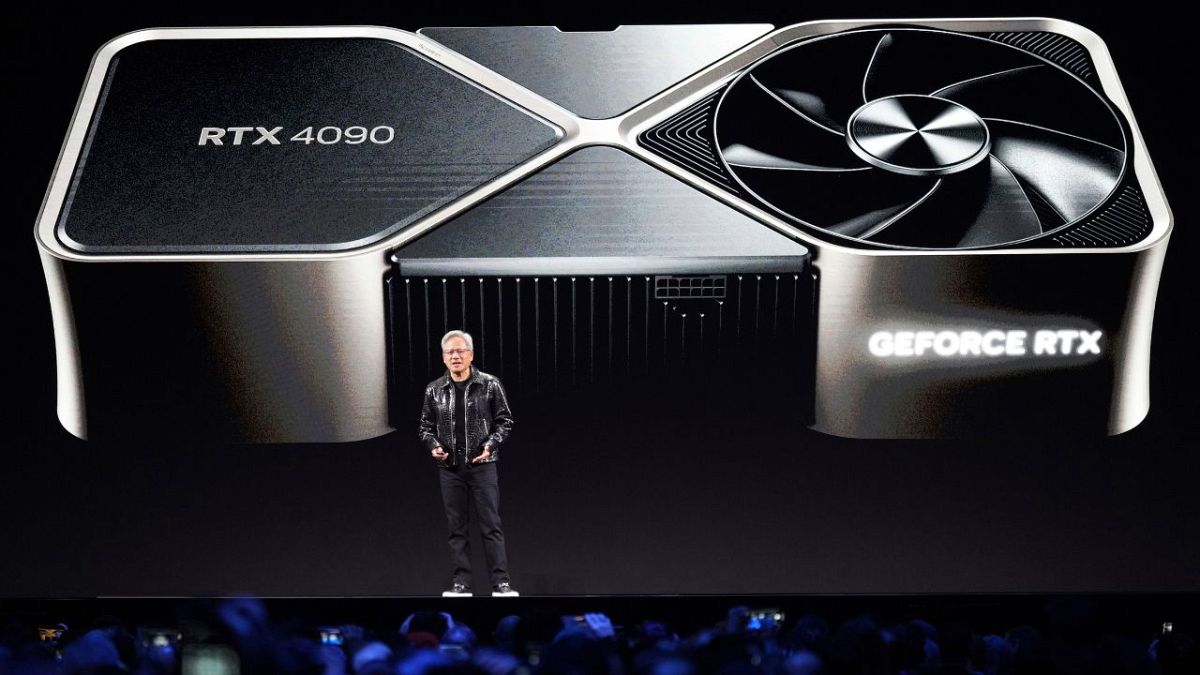


Euronews Next was at the chip-maker’s keynote speech in Las Vegas, which saw a rare appearance by founder and CEO Jensen Huang.
Chip maker Nvidia has announced its own foundation models, an artificial intelligence (AI) supercomputer, and a partnership with Toyota for automated driving at the CES technology fair in Las Vegas.
In CES’ keynote speech on Monday, the company’s founder and CEO Jensen Huang came onto the stage wearing his signature black leather jacket that came with a twist as it was adorned with sparkles that matched a massive wafer that had 72 chips on it.
The massive wafer has 600,000 parts and 2 miles of copper cable, he said to a packed audience.
It comes as part of Nvidia’s so-called Project Digits, a personal AI supercomputer that provides AI researchers, data scientists and students worldwide with access to the power of the Nvidia Grace Blackwell.
“AI will be mainstream in every application for every industry. With Project Digits, the Grace Blackwell Superchip comes to millions of developers,” said Huang.
“Placing an AI supercomputer on the desks of every data scientist, AI researcher and student empowers them to engage and shape the age of AI”.
With the supercomputer, developers can run up to 200-billion-parameter large language models to supercharge AI innovation, the company said.
The technology will be available in May and prices start from $3,000 (€2,800).
Huang said the next stage of AI is physical AI, which the company says means autonomous machines can perceive, understand, and perform complex actions in the real world.
“Physical AI will revolutionise the $50 trillion (€48 trillion) manufacturing and logistics industries,” Huang said.
“Everything that moves — from cars and trucks to factories and warehouses — will be robotic and embodied by AI”.
Nvidia also announced a partnership with Toyota to bring automated driving capabilities to new vehicles.
“The autonomous vehicle revolution has arrived, and automotive will be one of the largest AI and robotics industries,” said Huang.
Autonomous vehicle companies Aurora and Continental also this week announced a long-term partnership to deploy driverless trucks at scale, powered by Nvidia Drive, the company’s AI-assisted driving platform.
Another way Nvidia is betting on physical AI is with its own foundation models. Nvidia announced a platform of world foundation models designed for robotics called Cosmos.
These are open and available from Nvidia, GitHub, and Hugging Face.
Huang also announced a “family” of new chips for desktop and laptop PCs that use the company’s fastest AI processors for data centres
Called the RTX 50-series, the graphics cards cost up to $1,999 (€1,900). The chips can be used to run AI models but also computer graphics, and can use AI to boost gaming frame rates.
Nvidia said the new processors will also be powerful enough to to run large language models (LLMs).